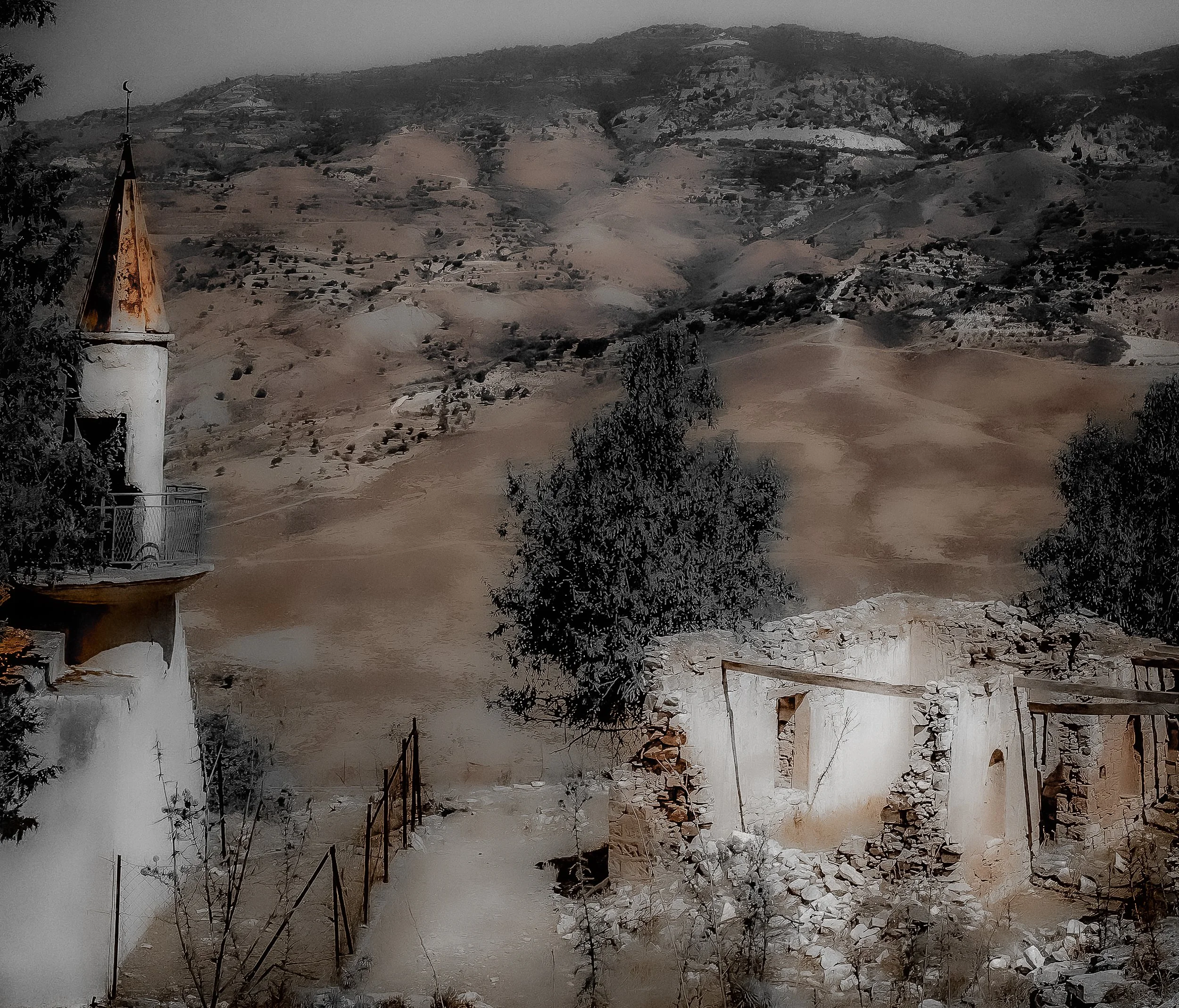Abandoned Villages of the Diarizos Valley: 2)
Maronas/ Ulucam - The Forgotten Peak
The Forgotten Peak
Atop the heights where warm winds wail,
A village sleeps, so stark, so pale,
.A broken gate, a rusted bell,
A fountain dry where wishes fell.
But when the moon with silver gleam
Illuminates the frozen dream,
The village stirs in fleeting light,
A memory held within the night.
The mountain guards this lonely place,
Wrapped in its mist’s embrace,
A silent witness, vast and still,
To time’s great march, to fate’s cold will.
From our lofty heights we skeletons keep a quiet watch, lookouts over the valley. Hidden by the folds of the slopes and tucked behind almond and pine and olive, we are little more than a rumour. invisible from the highway that traces the length of the vale, along which our brothers and sisters, villages of the Diarizos, lie, alive or dead.
But we are here – Peace suits us
You want to find us — and few do — you’ll need to know the way? Just past Ayios Georgios, turn off the asphalt and take the dirt road that creaks over a fragile ford. Most of the year the riverbed is dry, save for a teasing trickle in spring. Then, the path winds upward through wild almonds and ancient olives, twisting with the breeze, hiding the valley below. Sunlight penetrates in golden shafts of light from the high-strung sun. Around one last bend Maronas reveals itself — not with grandeur, but with grace. A scatter of old stones on a steep slope, overlooking a dream of green and gold. It’s quiet up here. The kind of quiet that sits gently in our souls.






Where did the village get its name? Depends which home you ask.
Predictably our Christian residents - when we had them - gave the honour of the Greek name to a 4th century hermit from the Taurus mountains, and the Maronite Christian movement which found its way to Cyprus. A life of prayer and solitude, St Maron, the mountain ascetic, would have felt at home in our towering hideaway.
The name survived the arrival of the Ottoman’s better than the Maronites themselves. My old friend, the crumbling barn at the end of our track, mischeivously claims — with a grin in his crumbling timbers — that it was guilt that led the Muslim newcomers to rename us Uluçam: “magnificent pine”. I feel sympathy for the many imposing olive trees which frame and blend into our frail structures that they were not worthy of recognition.






The calm of our mountain retreat - with its spectacular sunsets and warm currents on which kestrels glide and dive, disturbing warblers who scold but never leave - began to dissolve. First the Greek homes fell silent, their occupants scattering into nearby villages. Mine held out longer, for a while the only Greek voices on our streets. But fear seeps in like rising damp and soon I was left empty too.










Then, for a brief, golden pause, our hollowed-out village revived. Turkish families, seeking refuge from unrest on the far side of the valley, found sanctuary in our peace. I smelled dolma cooking again. Children played in me and chickens strutted around me. My stones felt useful once more.
Our imam was pleased — his cami, humble and proud, was full again. But the muhtar, always practical, fretted over whether our steep slopes could support us all.
He did not fret for long.
Hope can be a fragile thing in Cyprus.
My restored homely comforts and the muhtar’s qualms soon became collateral damage to man’s disputations. For over a year I heard the sounds of walls and ceilings wailing as mothers packed bundles, tied tight. They faded away with the inevitability of the early morning mist that cowers at the bottom of our valley waiting to be dissolved by the rising sun’s rays. Doors were left ajar and the breeze wandered in. Footsteps faded on overgrown paths, only the wind sang a hymn, but without hope.
And then nothing. Just the breeze, wandering through half-shut shutters.







Today echoes are left unheard, windows stare out hollow-eyed, rooftops decay – a village on a map with no markings, abandoned, pigs the only residents. Our mosque still holds its roof – its dignity in contrast to the homes of its former congregation. Trees have grown bold, their roots stretching through our foundations like fingers reaching for memory. We are left alone with nature, high and exposed, eavesdropping on passersbys below.
But we — the bones of Maronas — are content, in our own way. We have the sky, the kestrels, the murmuring wind. We hear the road below, but it no longer reaches us. And that, perhaps, is a blessing.
Maronas/ Ulucam Population Census
Source: PRIO - Cyprus


